For the 2025 school year, there is 1 public preschool serving 467 students in Detroit Leadership Academy School District. This district's average pre testing ranking is 1/10, which is in the bottom 50% of public pre schools in Michigan.
Public Preschool in Detroit Leadership Academy School District have an average math proficiency score of 2% (versus the Michigan public pre school average of 32%), and reading proficiency score of 6% (versus the 40% statewide average).
Minority enrollment is 100% of the student body (majority Black), which is more than the Michigan public preschool average of 39% (majority Black).
Overview
This School District
This State (MI)
# Schools
2 Schools
1,089 Schools
# Students
731 Students
372,198 Students
# Teachers
40 Teachers
24,811 Teachers
Student : Teacher Ratio
18:1
18:1
District Rank
Detroit Leadership Academy School District, which is ranked within the bottom 50% of all 851 school districts in Michigan (based off of combined math and reading proficiency testing data) for the 2021-2022 school year.
The school district's graduation rate of 75-79% has increased from 70-79% over five school years.
Overall District Rank
#857 out of 866 school districts
(Bottom 50%)
(Bottom 50%)
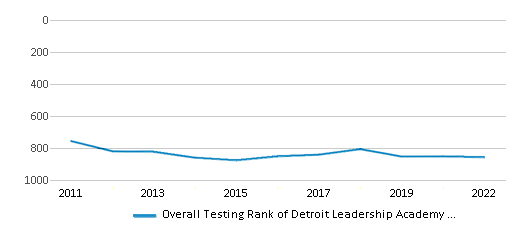
Math Test Scores (% Proficient)
2%
34%
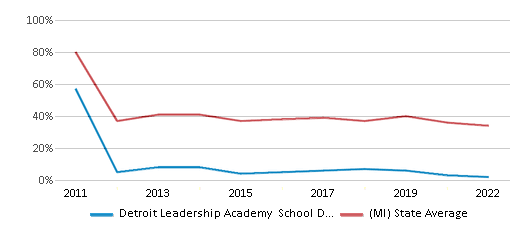
Reading/Language Arts Test Scores (% Proficient)
7%
45%
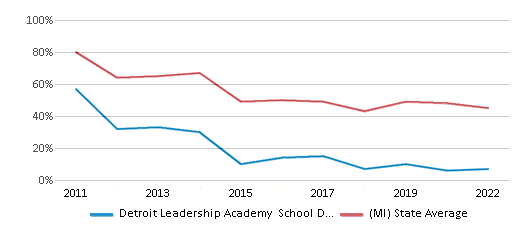
Science Test Scores (% Proficient)
≤5%
38%
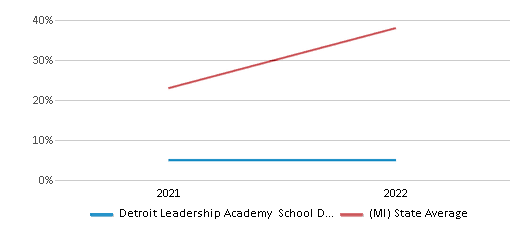
Graduation Rate
75-79%
81%
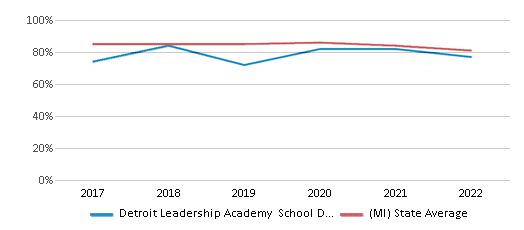
Students by Ethnicity:
Diversity Score
0.05
0.58
# American Indian Students
4 Students
2,804 Students
% American Indian Students
1%
1%
# Asian Students
n/a
11,161 Students
% Asian Students
n/a
3%
# Hispanic Students
3 Students
33,151 Students
% Hispanic Students
n/a
9%
# Black Students
714 Students
79,200 Students
% Black Students
98%
21%
# White Students
4 Students
225,969 Students
% White Students
n/a
61%
# Hawaiian Students
1 Student
334 Students
% Hawaiian Students
n/a
n/a
# Two or more races Students
5 Students
19,240 Students
% of Two or more races Students
1%
5%
Students by Grade:
# Students in PK Grade:
-
-
# Students in K Grade:
55
69,777
# Students in 1st Grade:
52
60,475
# Students in 2nd Grade:
53
57,993
# Students in 3rd Grade:
56
50,568
# Students in 4th Grade:
48
49,172
# Students in 5th Grade:
51
42,380
# Students in 6th Grade:
53
13,776
# Students in 7th Grade:
51
8,200
# Students in 8th Grade:
48
7,855
# Students in 9th Grade:
72
2,836
# Students in 10th Grade:
66
2,672
# Students in 11th Grade:
74
2,566
# Students in 12th Grade:
52
2,595
# Ungraded Students:
-
1,333
District Revenue and Spending
The revenue/student of $11,706 in this school district is less than the state median of $18,510. The school district revenue/student has stayed relatively flat over four school years.
The school district's spending/student of $12,373 is less than the state median of $17,693. The school district spending/student has stayed relatively flat over four school years.
Total Revenue
$9 MM
$25,476 MM
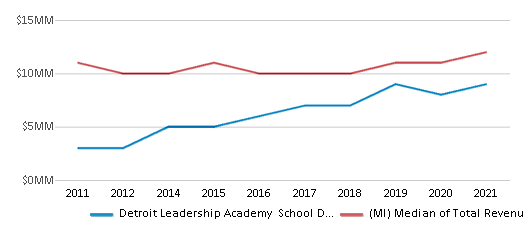
Spending
$9 MM
$24,351 MM
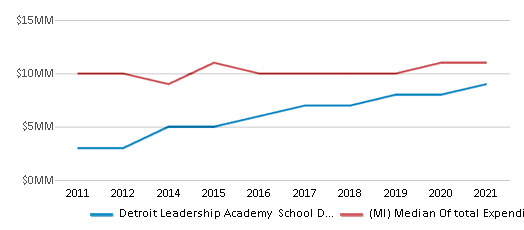
Revenue / Student
$11,706
$18,510
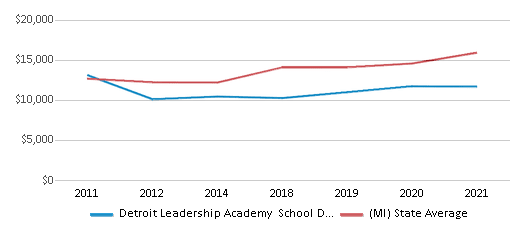
Spending / Student
$12,373
$17,693
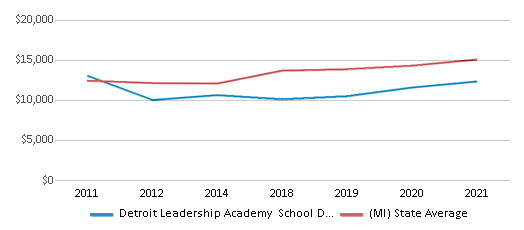
Best Detroit Leadership Academy School District Public Preschools (2025)
School
(Math and Reading Proficiency)
(Math and Reading Proficiency)
Location
Grades
Students
Rank: #11.
Detroit Leadership Academy K8
Charter School
(Math: 2% | Reading: 6%)
Rank:
Rank:
1/
Bottom 50%10
13550 Virgil St
Detroit, MI 48223
(313) 242-1500
Detroit, MI 48223
(313) 242-1500
Grades: PK-8
| 467 students
Recent Articles

Year-Round Or Traditional Schedule?
Which is more appropriate for your child? A year-round attendance schedule or traditional schedule? We look at the pros and cons.

Why You Should Encourage Your Child to Join a Sports Team
Participating in team sports has a great many benefits for children, there is no doubt. In this article you will learn what those benefits are.

White Students are Now the Minority in U.S. Public Schools
Increasing birth rates among immigrant families from Asia and Central and South America, combined with lower birth rates among white families, means that for the first time in history, public school students in the United States are majority-minority. This shift in demographics poses difficulties for schools as they work to accommodate children of varying language abilities and socio-economic backgrounds.





